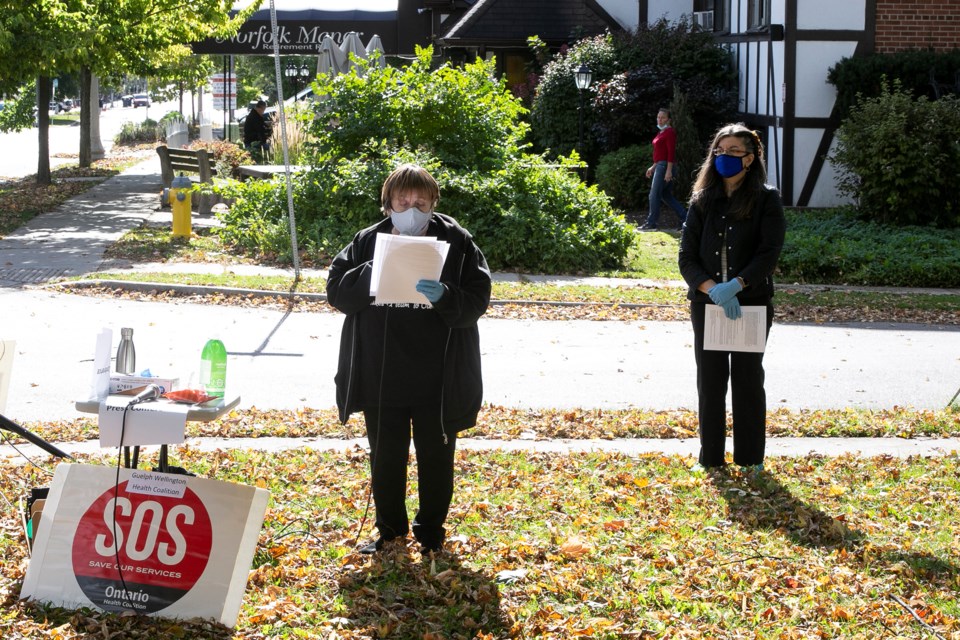Advocacy groups and unions representing the health care sector are calling on the provincial government do much more when it comes to protecting people living in long term care, as well demanding a halt to creeping privatization of health care in Ontario.
On Thursday morning the Ontario Health Coalition held a press conference on Norfolk Street in Guelph in partnership with CUPE Local 57 and Concerned Friends of Ontario Citizens in Long Term Care Facilities. It was part of a ‘day of action’ with similar events being held across Ontario and in Toronto at Queen’s Park.
The backdrop for the Guelph press conference was Norfolk Manor, a privately owned retirement residence that was the site of a COVID-19 outbreak which saw 22 people infected before it was reported as over in mid May.
“Seven people died here. That’s significant,” said Magee McGuire, co-chair Ontario Health Coalition Guelph Wellington.
A press release sent on the event said the fact it was being held in the shadow of a private long term care facility hit hard by COVID was "coincidental."
Norfolk Manor did not immediately reply to a request for comment.
In total, over 1,900 people living in long term care facilities in Ontario died as a result of COVID-19.
CUPE Local 57 president Linda Pellegrini said many of the people who contracted COVID-19 in long term care homes in Ontario were not taken to hospital.
“In the first phase of COVID-19 very few long term care residents who (contracted) COVID-19 were transported to hospitals to protect precious hospital beds and resources for younger people,” said Pellegrini.
She called the number of COVID-19 deaths among long term care residents appalling. She wants to see residents who are infected with the disease in the future cared for in hospital.
“These women and men built this country and deserve that at the very least,” said Pellegrini.
The Ontario Health Coalition and CUPE is asking the Ontario government to pass the Time to Care Act, a private members bill which calls for a minimum of four hours of care per long term care resident every day.
“For the sake and wellbeing of the thousands of people in long term care we demand a minimum standard of care,” said Pellegrini.
McGuire said the coalition is also asking the government to phase out private long term care facilities and return Ontario to a system that is publicly funded.
About three quarters of the COVID-19 deaths in long term care homes occurred in privately owned and operated LTC facilities, said Pellegrini.
Nicol said there is a difference in the level of care received by residents between publicly and privately funded models for long term care.
“If it is publicly paid there is a different standard than the ones that are privately paid,” she said.
The whole system needs an overhaul, said Laurie Nicol, vice-president of Concerned Friends of Ontario Citizens in Long Term Care Facilities.
Concerned Friends has been advocating on behalf of long term care residents since it was formed in 1980. She said there has always been issues with the system, with staffing shortages in long term care facilities being identified as critical far before the pandemic took hold earlier this year.
“The tragic loss of our loved ones due to COVID-19 merely brought it to the attention of the general public and the government,” said Nicol. “Four hours of minimum care is only one piece of a strategy that needs to be developed for how we care four our elderly.”
Nicol is calling for the Ministry of Health and Long Term Care to bring back annual inspections of the province’s 627 long term care facilities.
The practice of annual inspections for every facility was cancelled in 2018, shortly after Premier Doug Ford’s Ontario PC government took office. Nicol said only eight were completed by the ministry in 2019.
Although the annual inspections were cancelled, the ministry still conducts critical incident inspections in response to complaints or injuries.
Nicol said her group audits those inspections and has seen an increase in compliance orders and director referrals as a result of those critical incident inspections since the annual inspections were cancelled.
Concerned Friends was also a member of the resident quality inspection advisory group which met quarterly to provide feedback to the ministry about inspections of long term care homes.
“When the Ford government took office the director of the long term care inspection branch notified us that the group was being disbanded,” said Nicol. “We believe there should be a resurrection of this advisory group with more accountability reporting directly to the minister of long term care.”
After a number of delays, Ontario’s independent Long Term Care COVID-19 Commission is expected to deliver its final report in April 2021.
“This is a political ploy to put off responsibility of the province to do the right thing during COVID to help our loved ones to get better, to have safe accommodation, food, care,” said McGuire.
She is also concerned the Ontario government plan for dealing with line ups at COVID-19 assessment centres is to introduce more privatization in health care in the province.
“Another is to pay pharmacies to do COVID testing while many of our hospital labs sit empty and they are already publicly paid for,” said McGuire.
She hopes newly-approved rapid testing will help the province to deal with the backlog of testing.
“These can help us rise to the challenge of these long line ups,” said McGuire.
